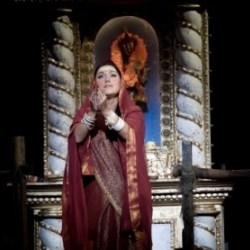The Pearl Fishers (London Coliseum)
Fishing for compliments to pay this revival of Bizet’s tunefest, I only netted a couple. Most notably, director Penny Woolcock‘s updating of The Pearl Fishers from a hokum version of Ceylon to an unspecified far-eastern location in the present day had both beauty and irritation when first seen on 2010, but now with commendable artistic humility she has rethought it extensively, enhancing the former quality and excising the latter almost completely.

The Pearl Fishers (ENO)
© Mike Hoban/ENO
Dick Bird‘s sets and Jen Schriever‘s lighting are still recognisably as before, but the celebrated swimming scenes are expanded and, in video designs by 59 Productions, augmented by a dramatic tsunami. The love-triangle’s backdrop of a wretched shanty-town has become an even darker presence.
It was announced that soprano Sophie Bevan had come down with a gastric bug earlier in the day, but she held it together brilliantly as Leïla. Indeed, if someone had asked me to guess which principal had been feeling unwell I’d have named any of the three male singers ahead of her. While not always her usual creamy, carefree self, the hugely talented young diva kept the musical boat afloat even when it threatened to capsize. Her rendition of ‘Comme autrefois’ in Act 2 was the evening’s highlight despite the handicap of Martin Fitzpatrick’s flat translation.
Four years ago, in some felicitous casting, the tortured Zurga was sung by Hawaiian baritone Quinn Kelsey and the romantic tenor Nadir by Afie Boe. How times change. Today, Kelsey is a star of the Met while Boe has opted for an entirely different career path. This time it’s George von Bergen and John Tessier who have inherited their roles, and sadly it’s not an upgrade. Von Bergen’s timbre has started to spread alarmingly at full stretch; not his fault, of course, and something he worked hard to curb during the eternal bromance duet, ‘Au fond du temple saint’, but still difficult to enjoy. Tessier’s tenor voice is sweet but reedy and too small for the part, which made his scenes with Bevan a bit one-sided. Neither was there much to convince in the lower bass register of Barnaby Rea‘s high priest Nourabad.
In an evening that felt like an end-of-season chore, the ENO Orchestra, who’ve played like lions all year, sounded frayed and out of sympathy with conductor Jean-Luc Tingaud‘s languid tempo choices. Thankfully, the ever-ready ENO Chorus was on hand and ready to shine to order, despite being required to sing with a raised chest cavity whenever Woolcock demanded a massed supplication to Brahma.










